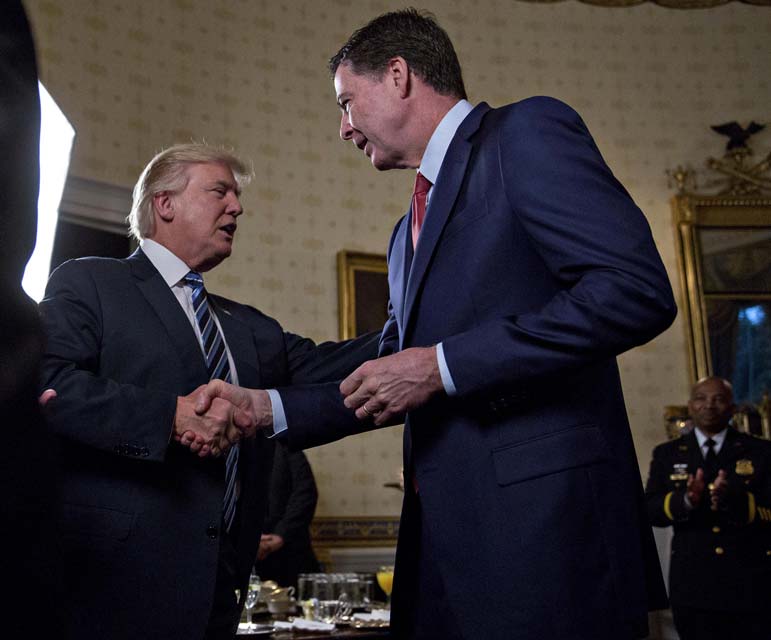 Trump and Comey in days past. Andrew Harrer for Bloomberg
Trump and Comey in days past. Andrew Harrer for Bloomberg
President Donald Trump is clearly worried that former FBI director James Comey is going to come after him, through the media. That's what Friday's tweet about "tapes" was all about.
Trump tweeted: James Comey better hope that there are no "tapes" of our conversations before he starts leaking to the press!
Four days later, a person described by the New York Times as "one of Mr. Comey's associates" leaked a portion of Comey's notes from a February meeting with the president. According to the notes, Trump expressed to Comey his desire for the FBI to drop an investigation into former national security adviser Michael Flynn.
The revelation certainly doesn't reflect well on Trump; it contributes to an appearance that he has been trying to obstruct probes related to his campaign and its possible collusion with Russia during the election.
In other words, the leak was exactly the kind of thing Trump fears. On "Fox & Friends" Wednesday morning, co-host Brian Kilmeade said he believes Comey was behind the sharing of his notes with the New York Times.
"You don't get that memo unless James Comey gives you that memo," Kilmeade said. "You don't make that phone call unless James Comey tells you to make the phone call."
We don't know whether that is what actually happened. The Times might not even know whether its source was authorized by Comey or not. But it is worth considering whether Comey would, indeed, go to war with Trump by leaking damaging information to journalists.
An examination of his record in government leads to one inexorable conclusion: If Comey were to become a leaker, he would turn into the very thing that he fought against as a public servant.
"I've spent most of my career trying to figure out unauthorized disclosures and where they came from," Comey said in congressional testimony March 20. "It's very, very hard."
In that same hearing, before the House Intelligence Committee, Comey spoke at length about his disdain for leaks. He said that "any unauthorized disclosure of classified conversations or documents is potentially a violation of law and a serious, serious problem."
He said that "a lot" of information leaked to the media "is just dead wrong."
He also seemed to endorse the view that Trump has been hit by more leaks than his predecessors and even flirted with support for the president's claim that reporters make things up, when he said this: "It does strike me there's been a lot of people talking - or, at least, reporters saying people are talking to them - in ways that have struck me as unusually active."
These are words that could come back to haunt Comey - especially the words that were designed to cast doubt on the veracity of news reports based on leaks. If Comey were to attempt to hurt Trump by leaking information, his effort could only be effective if people were to trust the ensuing press coverage. Comey has told the public - quite recently - that reports based on leaks should be eyed skeptically.
Comey testified again May 3, before the Senate Judiciary Committee, and had this exchange with Sen. Charles E. Grassley, R-Iowa:
GRASSLEY: Director Comey, have you ever been an anonymous source in news reports about matters relating to the Trump investigation or the Clinton investigation?COMEY: Never.
GRASSLEY: Question two, relatively related, have you ever authorized someone else at the FBI to be an anonymous source in news reports about the Trump investigation or the Clinton investigation?
COMEY: No.
When Comey was deputy attorney general, in 2003, he appointed special prosecutor Patrick J. Fitzgerald to lead an investigation into whether George W. Bush administration officials illegally leaked the name of CIA operative Valerie Plame to a journalist. When New York Times reporter Judith Miller refused to name her confidential source, she spent almost three months in jail for contempt of court.
In 2005, Comey submitted written testimony to the Senate Judiciary Committee opposing a federal shield law that would have protected journalists from going to jail, as Miller did, when they are unwilling to identify leakers.
"The bill would create serious impediments to the department's ability to effectively enforce the law and fight terrorism," Comey wrote, referring to the effect on the Justice Department.
Comey's testimony in March suggested that he has not softened in the past 12 years. "I do think it should be investigated aggressively," he said of leaks, "and, if possible, prosecuted so people take as a lesson, this is not okay. This behavior can be deterred, and it's deterred by locking some people up who have engaged in criminal activity."
However! My colleague, Aaron Blake, spoke Wednesday with former Justice Department spokesman Matthew Miller, who thinks it would not be unprecedented for Comey to leak a document that could help protect his reputation. Miller recalled an episode that began in 2005 with Comey signing off on waterboarding as an interrogation tactic but also documenting his qualms in an email to his chief of staff.
"In 2009, when the Office of Professional Responsibility at the DOJ was investigating this issue and the New York Times wrote a story about it, magically Comey's email to his chief of staff appeared in that story - and made its way to OPR," Miller said. "I was at DOJ at the time, and what it told me was Comey had the presence of mind to write the email in the first place, print a copy of it when he left the department, sit on it for four years and be ready to give it to a reporter when someone questioned why he had signed off on torture."
Also, at the Senate hearing in May, Comey answered questions about his decision to write a letter to members of Congress shortly before the election, informing them that the FBI was reopening the Clinton email investigation. He said this: "I sent that letter only to the chairs and [ranking members]. Yes, did I know they were really going to leak it? Of course, I know how Congress works, but I did not make an announcement at that point."
Comey has been an anti-leak crusader, but there is at least some evidence that he is willing to make exceptions or furnish information in private that he knows someone else is likely to make public.
Previously:
• 05/17/17/ Fox News' Kimberly Guilfoyle is openly gunning for Sean Spicer's job
• 05/15/17/ Want a special prosecutor to take over the FBI probe? History might change your mind
• 05/09/17/ Hillary claims the media won't let her talk about campaign interference. Not quite
• 04/25/17/ Bill O' sounds like he is about to launch a revenge tour, not an apology tour
• 03/31/17/ It's clear from Trump's Supreme Court pick that his changing libel laws is an empty threat.
• 02/17/17/ Finally an end to 'fake news' stupidity? Newspaper goes to court
• 01/16/17/ He's with her: Trump revives Hillary's idea about kicking media out of White House
• 10/27/16: You won't believe how much Trump made for his media enemies
• 10/23/16: Trump TV already exists. It's called Right Side Broadcasting
• 08/15/16: If Donald Trump ever cleans up his act, Hillary Clinton could have a problem
• 06/06/16: Hillary makes her Second Amendment problem public
• 05/20/16: Lib pundits blame Deb Schultz, not Sanders, for Dems' division
• 05/05/16: Here's what we know about the big Donald Trump-Megyn Kelly interview
• 05/05/16: 12 of the most misguided media predictions about Donald Trump
• 04/28/16: Trump thinks it's time to label him the 'presumptive nominee.' Nope.
• 04/25/16: The 'nasty effect,' and why Donald Trump supporters mistrust the media
• 03/07/16: Even Trump's favorite TV hosts, Scarborough and Bill O', can't avoid feuding with him
• 03/04/16: Mitt Romney: Media darling?
• 03/02/16: Donald Trump: The King of the 'No Comment'
• 02/29/16: Why this new media narrative could actually, for once, hurt Donald Trump
• 02/26/16: Why haven't Trump's tax returns, Clinton's speech gotten the Romney treatment?
• 02/08/16: In media coverage of Chelsea Clinton, the kid gloves are still on


 Contact The Editor
Contact The Editor
 Articles By This Author
Articles By This Author